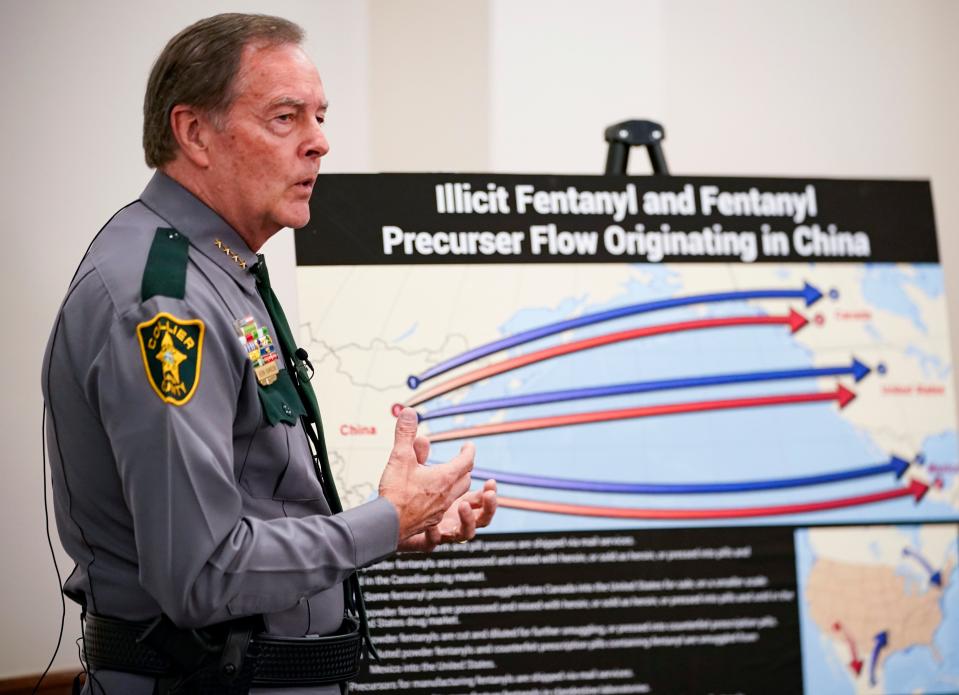A Collier deputy testified about his on-the-job fentanyl overdose. Did it really happen?
In February, Collier County Sheriff’s Deputy Robert Palmer told a state Senate committee about an on-the-job exposure to fentanyl that he said left him gasping for breath and in need of Narcan to recover.
“This is invisible. We have no way to see, we have no way to react to this until, God forbid, we get exposed to this and the symptoms set in,” said Palmer, who was testifying in favor of a bill to make exposing first responders to fentanyl a felony.
The synthetic opioid, which is 50 times stronger than heroin, is the biggest driver of overdose deaths both in Florida and nationwide. And law enforcement agencies, both in Southwest Florida and elsewhere, have raised the alarm about risks to officers from accidental exposure.
But toxicologists say that incidental exposure of the kind described by affected police officers is extremely unlikely to cause overdose. And in Palmer’s case – like virtually all such cases across the country – officials have released no evidence that he actually ingested any fentanyl.
Palmer and his partner were responding to a domestic disturbance on April 11, 2023 when Palmer began having trouble breathing, according to an incident report. Palmer asked the victim if she or her abuser had used fentanyl before collapsing to the ground, according to the report. Palmer’s partner administered two doses of Narcan and Palmer was taken to a local hospital for treatment and evaluation.
The Collier County Sheriff’s Office confirmed to the Naples Daily News that no fentanyl was recovered at the scene of Palmer’s alleged overdose. No drug charges were filed against people at the scene, according to the incident report. And the Sheriff’s Office would not say if Palmer was tested for fentanyl exposure after the incident, citing medical privacy.
“I’m not gonna take any chances with our people. At this point we’re going to say we believe it was fentanyl,” Sheriff Kevin Rambosk said in a January interview. “It was pretty clear that the deputy collapsed, and that Narcan brought him back.”

New Florida fentanyl law adds penalties for first responder exposure
Medical experts have voiced concerns that the exposure law, which was signed by Gov. Ron DeSantis earlier this month, could dissuade people from calling 911 for help during a fentanyl overdose.
“National bodies of experts have thoroughly assessed the risk of exposure to fentanyl during emergency response and have determined it to be extremely low,” wrote Dr. José G. Cabañas, president of the National Association of EMS Physicians, in an email to USA TODAY Network-Florida. “It is essential to recognize that such a policy could also potentially discourage bystanders or family members from reaching out for emergency assistance during an overdose.”
Dr. James Chenoweth, director of toxicology research at UC Davis Health, said that incidental exposure to fentanyl is incredibly unlikely to cause any symptoms. Fentanyl, and even its more potent cousins like carfentanil, are not easily absorbed through the skin, he said.
“If you covered your hands, both palms, with fentanyl patches, it would take 15 minutes roughly to absorb a therapeutic dose of fentanyl,” Chenoweth said. “That type of exposure is essentially a non-risk, even with the fentanyl analogues.”
Inhaling fentanyl powder could potentially cause an overdose, Chenoweth said, with the growing street presence of drugs like carfentanil and sufentanil increasing that risk. The American College of Medical Toxicology recommends that first responders wear N95 masks when handling powdered fentanyl.
“The risk of that becoming concentrated enough in the air that you’re going to inhale enough to cause any symptoms is very low,” he said. “I could foresee a situation where someone like, threw the powder out of anger into someone’s face.”
Rambosk said his office provides Narcan to both deputies and their families, as part of an exposure control plan to protect members of the force from accidental overdose.
“You can handle pills all you want, it’s not going to do anything to you. In powder form, you better not be breathing it,” Rambosk said.
Other elements of the sheriff’s office’s messaging have not been quite so measured.
“Fentanyl is so powerful that it can affect you even if you don’t ingest it,” a public education video released last year by the sheriff’s office claimed.
Opioid overdoses cause slowed breathing and kill through respiratory arrest, Chenoweth said. In viral videos of alleged exposures, first responders often show symptoms more consistent with a panic attack, including hyperventilation, Chenoweth said.
“I can understand their anxiety about it if you’re seeing people overdosing on a regular basis, but I think the level of concern that a lot these groups express and the media articles that just report it out with out any skepticism - it does a disservice to all the first responders because it increases their anxiety about this type of thing,” he said.
The lack of evidence for overdoses doesn’t mean that first responders are lying or faking symptoms, Chenoweth said.
“The initial concern leads to true physiologic fight-or-flight response,” he said.
Last year, researchers searched through medical databases and National Institute for Occupational Safety and Health reports to find all reported cases of occupational exposure to fentanyl.
The review, published in the journal Clinical Toxicology, found 27 reports of first responders who experienced symptoms after possible ambient fentanyl exposure. But none of those cases were confirmed by drug testing, and none were consistent with opioid overdose.
“Only three persons received naloxone, although none had plausible effects of fentanyl. No suspected exposure to fentanyl led to hospitalization or death,” the review found. “Based on these low-quality data, there were no plausible opioid effects from ambient exposure to suspected fentanyl.”
Tallahassee Democrat journalist Ana Goñi-Lessan contributed to this story.
This article originally appeared on Naples Daily News: Fentanyl danger: Does incidental exposure cause overdose?

